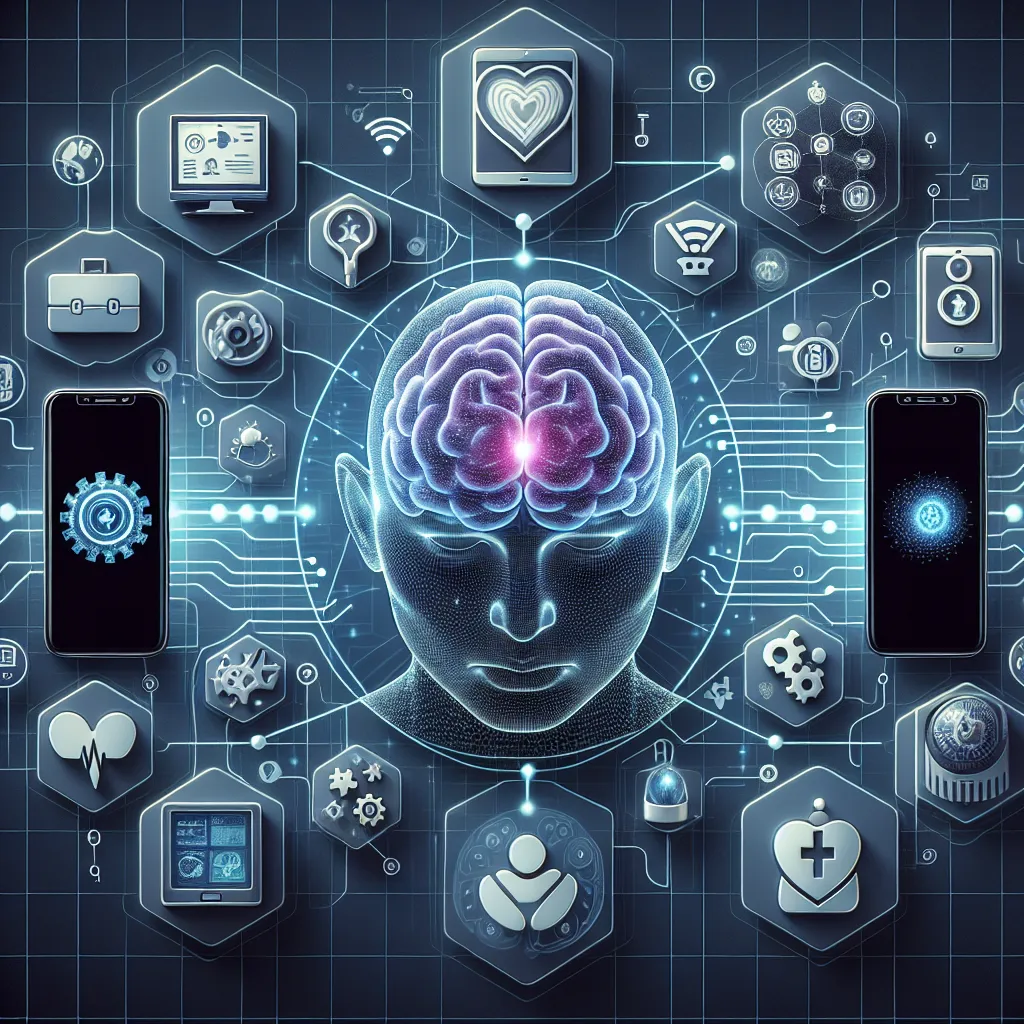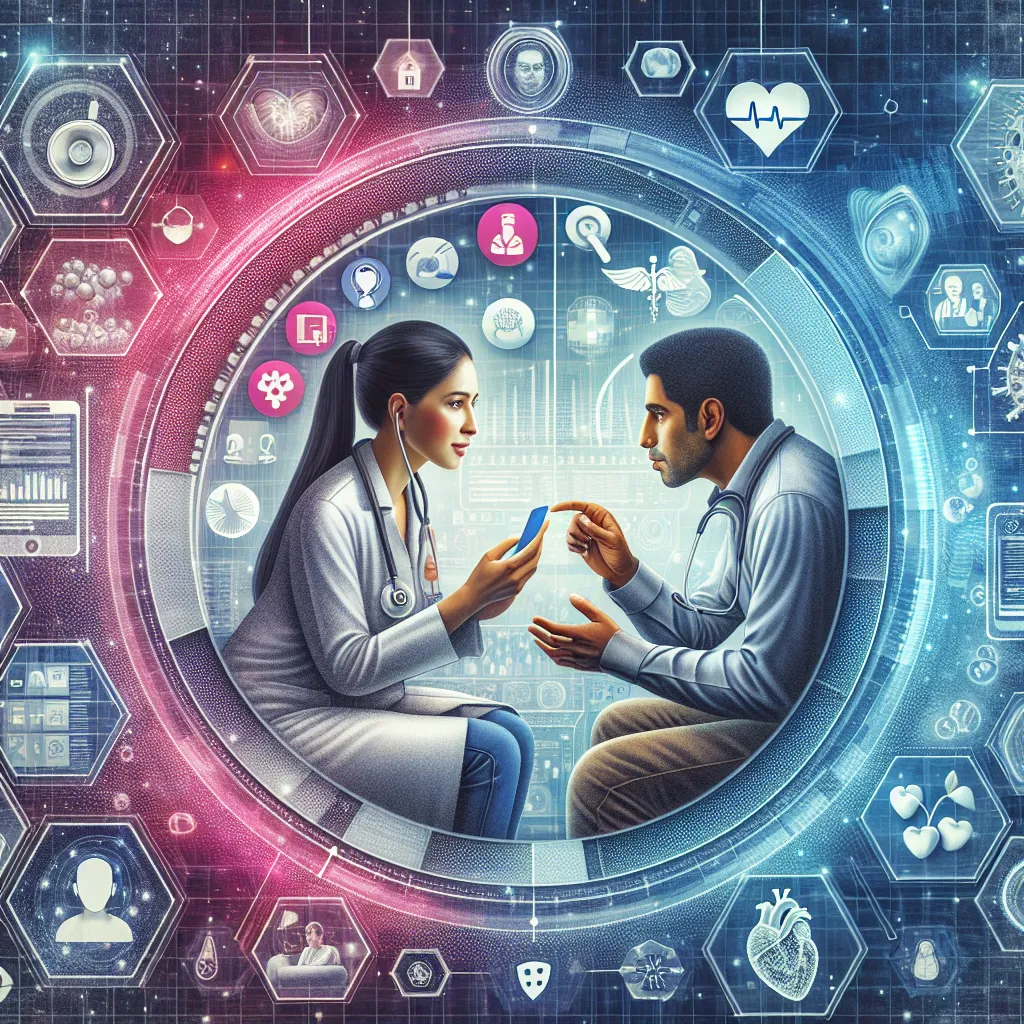Are you preparing for the IELTS Reading test and looking to enhance your skills on topics related to technology and mental health? Look no further! As an experienced IELTS instructor, I’m excited to share a comprehensive practice test that explores how technology is revolutionizing mental health treatment. This test will not only help you improve your reading comprehension but also familiarize you with the latest advancements in digital mental health solutions.
Nội dung bài viết
 Digital mental health solutions
Digital mental health solutions
IELTS Reading Test: Technology and Mental Health
Passage 1 – Easy Text
Digital Therapy: The Future of Mental Health Care
In recent years, the field of mental health has witnessed a remarkable transformation, thanks to the rapid advancements in technology. Digital therapeutics, a new category of health interventions, are leveraging smartphones, artificial intelligence, and data analytics to provide accessible and personalized mental health care. These innovative solutions are addressing some of the most pressing challenges in mental health treatment, including accessibility, affordability, and the stigma often associated with seeking help.
One of the most significant breakthroughs in this area is the development of mental health apps. These applications offer a range of services, from mood tracking and meditation guides to cognitive behavioral therapy (CBT) exercises. Users can access these tools anytime, anywhere, making mental health support more convenient than ever before. Moreover, many of these apps use machine learning algorithms to analyze user data and provide tailored recommendations, creating a truly personalized experience.
Teletherapy platforms have also gained popularity, especially in the wake of the COVID-19 pandemic. These platforms connect patients with licensed therapists via video calls, text messages, or voice chats. This approach not only makes therapy more accessible to those in remote areas or with mobility issues but also provides a sense of anonymity that can be comforting for individuals who feel uncomfortable with face-to-face sessions.
Virtual reality (VR) is another promising technology in mental health treatment. VR-based therapies are being used to treat a variety of conditions, including phobias, anxiety disorders, and post-traumatic stress disorder (PTSD). By creating immersive, controlled environments, therapists can help patients confront their fears and develop coping strategies in a safe, virtual setting.
While these technological advancements offer tremendous potential, it’s important to note that they are not meant to replace traditional therapy entirely. Instead, they serve as valuable complementary tools, expanding the range of options available to individuals seeking mental health support. As technology continues to evolve, we can expect even more innovative solutions that will further transform the landscape of mental health care.
Questions 1-5
Do the following statements agree with the information given in the passage?
Write
TRUE if the statement agrees with the information
FALSE if the statement contradicts the information
NOT GIVEN if there is no information on this
- Digital therapeutics aim to make mental health care more accessible and personalized.
- Mental health apps can only be used under the supervision of a therapist.
- Teletherapy has become more popular due to the COVID-19 pandemic.
- Virtual reality therapy is only effective for treating phobias.
- Technological advancements in mental health care are intended to completely replace traditional therapy methods.
Questions 6-10
Complete the sentences below.
Choose NO MORE THAN TWO WORDS from the passage for each answer.
- Mental health apps use to analyze user data and provide personalized recommendations.
- ___ platforms allow patients to connect with therapists through various digital communication methods.
- VR-based therapies create , environments for patients to confront their fears safely.
- Technology-based mental health solutions are considered to traditional therapy.
- The development of mental health apps is described as one of the most significant ___ in digital mental health care.
Passage 2 – Medium Text
The Rise of AI-Powered Mental Health Interventions
Artificial Intelligence (AI) is rapidly transforming the landscape of mental health care, offering new possibilities for diagnosis, treatment, and prevention of mental health disorders. As the global burden of mental illness continues to grow, AI-powered interventions are emerging as a promising solution to address the increasing demand for mental health services and to overcome limitations in traditional approaches.
One of the most significant applications of AI in mental health is in the realm of early detection and diagnosis. Machine learning algorithms can analyze vast amounts of data from various sources, including electronic health records, social media activity, and wearable devices, to identify patterns and risk factors associated with mental health conditions. These AI systems can detect subtle changes in behavior or language use that might indicate the onset of depression, anxiety, or other mental health issues, potentially allowing for earlier intervention and better outcomes.
Natural Language Processing (NLP), a branch of AI that focuses on the interaction between computers and human language, is being utilized to develop chatbots and virtual assistants specifically designed for mental health support. These AI-powered conversational agents can provide 24/7 emotional support, offer coping strategies, and even conduct basic cognitive behavioral therapy exercises. While not intended to replace human therapists, these tools can serve as a first line of support, particularly for individuals who may be hesitant to seek traditional therapy or who live in areas with limited access to mental health professionals.
AI is also revolutionizing the field of personalized treatment. By analyzing a patient’s genetic makeup, biomarkers, and treatment history, AI algorithms can predict which treatments are most likely to be effective for a particular individual. This approach, known as precision psychiatry, has the potential to significantly improve treatment outcomes by tailoring interventions to each patient’s unique biological and psychological profile.
Moreover, AI is enhancing the efficacy of existing therapeutic approaches. For instance, virtual reality exposure therapy for anxiety disorders can be augmented with AI to create more realistic and responsive virtual environments. AI algorithms can adjust the intensity of the virtual experience in real-time based on the patient’s physiological responses, ensuring a more personalized and effective treatment.
Despite the promising potential of AI in mental health care, there are important ethical and privacy considerations to address. The collection and analysis of sensitive personal data raise concerns about data security and patient confidentiality. Additionally, there are questions about the potential for bias in AI algorithms and the importance of maintaining human oversight in mental health interventions.
As research in this field continues to advance, it is likely that AI will play an increasingly significant role in mental health care. However, it is crucial to approach these technological innovations with a balanced perspective, recognizing both their potential benefits and limitations. The ultimate goal should be to harness the power of AI to complement and enhance human-delivered mental health services, rather than to replace them entirely.
Questions 11-14
Choose the correct letter, A, B, C, or D.
-
According to the passage, AI in mental health care is primarily used for:
A. Replacing human therapists
B. Diagnosis and treatment
C. Collecting patient data
D. Reducing healthcare costs -
Natural Language Processing in mental health applications is used to:
A. Translate therapy sessions
B. Analyze patient records
C. Develop conversational support tools
D. Predict treatment outcomes -
The concept of precision psychiatry involves:
A. Using AI to perform surgery
B. Tailoring treatments based on individual patient data
C. Developing new psychiatric medications
D. Conducting more precise diagnoses -
The passage suggests that the main ethical concern regarding AI in mental health is:
A. The cost of implementing AI systems
B. The potential for AI to replace human jobs
C. Issues related to data privacy and security
D. The accuracy of AI diagnoses
Questions 15-19
Complete the summary below.
Choose NO MORE THAN TWO WORDS from the passage for each answer.
AI is transforming mental health care through various applications. Machine learning algorithms can analyze data to aid in the (15) and diagnosis of mental health conditions. AI-powered (16) can provide constant emotional support and basic therapy exercises. In the field of treatment, AI contributes to (17) by predicting effective treatments based on individual patient data. AI also enhances (18) therapy by creating more responsive virtual environments. However, the use of AI in mental health raises concerns about (19) ___ and the need for human oversight.
Passage 3 – Hard Text
The Intersection of Neurotechnology and Mental Health: Pioneering Treatments and Ethical Dilemmas
The convergence of neuroscience and technology has given rise to a new frontier in mental health treatment: neurotechnology. This rapidly evolving field encompasses a wide range of innovative approaches that directly interface with the human brain to diagnose, monitor, and treat mental health disorders. As these technologies advance, they promise to revolutionize our understanding of the brain and offer unprecedented opportunities for intervention in neuropsychiatric conditions. However, the emergence of neurotechnology also raises complex ethical questions and challenges our traditional notions of mental health care.
One of the most promising areas of neurotechnology is brain-computer interfaces (BCIs). These devices, which can be invasive or non-invasive, establish a direct communication pathway between the brain and external devices. In the context of mental health, BCIs have shown potential in treating severe depression, anxiety disorders, and even addiction. For instance, deep brain stimulation (DBS), an invasive form of BCI, has been used to alleviate symptoms in treatment-resistant depression by targeting specific neural circuits associated with mood regulation. Non-invasive BCIs, such as electroencephalography (EEG)-based systems, are being explored for their potential in neurofeedback therapy, allowing patients to modulate their own brain activity in real-time to alleviate symptoms of various mental health conditions.
Another groundbreaking application of neurotechnology is optogenetics, a technique that uses light to control genetically modified neurons. While still primarily in the research phase, optogenetics holds immense promise for treating a range of neuropsychiatric disorders by allowing unprecedented precision in manipulating neural circuits. This approach could potentially lead to highly targeted treatments for conditions such as obsessive-compulsive disorder (OCD), post-traumatic stress disorder (PTSD), and schizophrenia, with fewer side effects compared to traditional pharmacological interventions.
Neuroimaging technologies, such as functional magnetic resonance imaging (fMRI) and positron emission tomography (PET), are also playing an increasingly important role in mental health care. These tools allow researchers and clinicians to visualize brain activity and structure in unprecedented detail, leading to better understanding of the neural basis of mental health disorders. Advanced machine learning algorithms applied to neuroimaging data are enabling more accurate diagnosis and prognosis of conditions like depression, bipolar disorder, and Alzheimer’s disease. Moreover, real-time fMRI neurofeedback is emerging as a novel treatment approach, allowing patients to voluntarily regulate their brain activity based on immediate feedback from brain scans.
The integration of artificial intelligence (AI) with neurotechnology is further amplifying the potential of these interventions. AI algorithms can analyze vast amounts of neurological data to identify patterns and biomarkers associated with mental health conditions, potentially leading to earlier and more accurate diagnoses. In treatment, AI can help optimize neurostimulation parameters in BCIs or DBS, tailoring the intervention to each patient’s unique neural profile.
While the potential benefits of neurotechnology in mental health are substantial, they are accompanied by significant ethical and societal challenges. The ability to directly manipulate brain function raises questions about personal autonomy, identity, and the nature of consciousness itself. There are concerns about privacy and data security, given the sensitive nature of the information collected by these technologies. The potential for misuse or unintended consequences of neurotechnology, such as cognitive enhancement in healthy individuals or the exacerbation of existing mental health disparities, also warrants careful consideration.
Moreover, the integration of neurotechnology into mental health care challenges our traditional understanding of mental illness and treatment. As we gain the ability to modulate brain activity directly, the boundaries between “normal” and “disordered” mental states may become increasingly blurred. This shift could have profound implications for how we conceptualize mental health and the goals of psychiatric treatment.
As neurotechnology continues to advance, it is crucial to foster an interdisciplinary dialogue involving neuroscientists, clinicians, ethicists, policymakers, and patients. This collaborative approach is essential to ensure that these powerful tools are developed and implemented responsibly, with adequate safeguards to protect patient rights and well-being. The future of mental health treatment lies at the intersection of neuroscience, technology, and ethics, promising transformative possibilities while demanding careful navigation of the complex landscape it creates.
Questions 20-24
Complete the table below.
Choose NO MORE THAN THREE WORDS from the passage for each answer.
| Neurotechnology | Application in Mental Health |
|---|---|
| Brain-computer interfaces | Treating severe depression and (20) ___ |
| (21) ___ | Controlling genetically modified neurons with light |
| Neuroimaging technologies | Visualizing brain activity and (22) ___ |
| Artificial Intelligence | Analyzing neurological data to identify (23) and (24) |
Questions 25-28
Choose FOUR letters, A-H.
Which FOUR of the following are mentioned in the passage as ethical concerns related to neurotechnology in mental health treatment?
A. Cost of implementation
B. Personal autonomy
C. Data security
D. Environmental impact
E. Cognitive enhancement in healthy individuals
F. Reduction in healthcare jobs
G. Exacerbation of mental health disparities
H. Overreliance on technology
Questions 29-40
Do the following statements agree with the claims of the writer in the passage?
Write
YES if the statement agrees with the claims of the writer
NO if the statement contradicts the claims of the writer
NOT GIVEN if it is impossible to say what the writer thinks about this
- Brain-computer interfaces can be both invasive and non-invasive.
- Optogenetics is currently widely used in clinical practice for treating mental health disorders.
- Neuroimaging technologies have led to a complete understanding of the neural basis of all mental health disorders.
- AI can help personalize neurostimulation treatments based on individual neural profiles.
- The ethical challenges posed by neurotechnology are easily resolvable.
- Neurotechnology may alter our fundamental understanding of mental illness and treatment.
- The integration of neurotechnology in mental health care will eliminate the need for traditional psychiatric medications.
- Real-time fMRI neurofeedback allows patients to regulate their brain activity consciously.
- The development of neurotechnology will eventually replace the need for human therapists.
- Privacy concerns related to neurotechnology are limited to data collection methods.
- Interdisciplinary collaboration is essential for the responsible development of neurotechnology in mental health care.
- The potential benefits of neurotechnology in mental health treatment outweigh the ethical concerns.
Answer Key
Passage 1
- TRUE
- NOT GIVEN
- TRUE
- FALSE
- FALSE
- machine learning
- Teletherapy
- immersive, controlled
- complementary tools
- breakthroughs
Passage 2
- B
- C
- B
- C
- early detection
- chatbots
- personalized treatment
- virtual reality
- data security
Passage 3
- anxiety disorders
- Optogenetics
- structure
- patterns
- biomarkers
- B, C, E, G
- YES
- NO
- NOT GIVEN
- YES
- NO
- NOT GIVEN
- YES
- NO
- YES
- NOT GIVEN
- YES
- NOT GIVEN
- NO
- YES
- NOT GIVEN
This comprehensive IELTS Reading practice test on “How Technology is Improving Mental Health Treatment” covers a wide range of topics related to digital mental health solutions, AI-powered interventions, and cutting-edge neurotechnology. By engaging with these passages and questions, you’ll not only improve your reading skills but also gain valuable insights into the fascinating intersection of technology and mental health care.
Remember to practice timing yourself and to review your answers carefully. Pay close attention to the vocabulary and sentence structures used in the passages, as they reflect the level of language proficiency expected in the IELTS exam.
For more practice on related topics, you might find these articles helpful:
- How Big Data is Changing Healthcare Systems
- Artificial Intelligence in Healthcare Diagnosis
- How Digital Technologies are Reshaping Healthcare
Keep practicing regularly, and you’ll be well-prepared for success in your IELTS Reading test!


